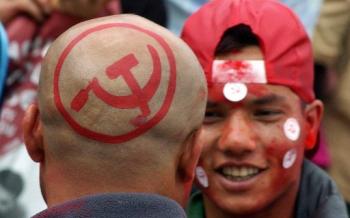In Nepal Maoists have won a huge vote in historic elections. In the lead up to the polls bourgeois commentators forecast a poor showing for the Maoists. They were victims of their own propaganda and completely out of touch with the situation. The polls reveal mass support for the revolutionaries.
Prachanda, the chairman of the Maoist party, won a seat in the heart of Kathmandu with nearly double the vote of his nearest rival. In Gorka, Babburam Bhattarai, the party’s other top leader, took the biggest majority in the country with a 40,000 vote lead on his nearest rival. The defeat for the establishment has been humiliating. Their leaders have lost seats: such as Madhav Kumar Nepal, General Secretary of the United Marxist Leninists (UML – a conservative party, despite the name); Shusil Koirala, acting president of Nepal Congress Party; Bam Dev Gautam, senior leader of UML and Khum Bhadur Khadka, senior leader of the Nepal Congress Party the main feudal party.
Observers say the elections have been conducted well. There were 100,000 election observers posted around Nepal. Out of a total of 20,889 polling stations only 75 reported irregularities and will be polling again. Over 60 percent turned out to vote which is pretty impressive for a country with 50 percent illiteracy.
Results are being announced as the votes are counted; even remote villages are getting progress reports on the hour through PA systems. Around the country people are tuning in to FM stations to hear the latest count. A website www.election.gov.np is being regularly updated as the counting goes on. Some violence was reported and, as usual, the establishment tried to put the blame on the Maoists. But the facts speak louder: in the month leading up to the elections 6 Maoist candidates were killed by opposition forces. The Maoists did not retaliate, they insisted they were committed to a peaceful election.
The election results will take some days to be finalised but the signs are that Nepal will have a radical new government.

